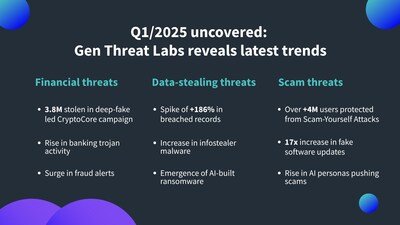[ad_1]
Gen Protects Millions of People as Breached Personal Information, Phishing Reports, Fake Browser Update Scams, and Scam-Yourself Attacks Are on the Rise
TEMPE, Ariz. and PRAGUE, May 28, 2025 /PRNewswire/ — Gen (NASDAQ: GEN), a global leader powering Digital Freedom with a family of trusted brands including Norton, Avast, LifeLock, MoneyLion and more, today released its Q1/2025 Gen Threat Report, highlighting the most significant shifts shaping the global Cyber Safety landscape observed between January and March 2025.
Key report findings include a 186% surge in breached personal information, a 466% increase in phishing reports, growth in fake browser update scams by 17 times the previous quarter’s levels, and more than 4 million people protected from Scam-Yourself Attacks, alongside the rise of mobile financial fraud and crypto-related US presidential inauguration scams.
“Online threats are evolving at a startling pace,” said Siggi Stefnisson, Cyber Safety CTO at Gen. “Attackers are moving away from broad, indiscriminate campaigns to highly personalized, AI-enhanced deception. Breached data and AI tools are giving cybercriminals just enough personal information and design sophistication to more easily manipulate people. That’s why we constantly evolve our cybersecurity solutions to be an interactive partner in fighting scams and to be one step ahead of cybercriminals.”
Notable Trends from the Q1/2025 Gen Threat Report:
Data Breaches Escalate
Data breaches are on the rise, with a 36% increase in the number of breaches faced by companies compared to last quarter. Individual breached records surged by more than 186%, revealing sensitive information such as passwords, emails, and credit card details. Attackers employed more advanced infostealers like Lumma Stealer, making data compromise faster and harder to detect.
Phishing Scams Designed to Bypass Security Filters
Reports of phishing scams rose by a staggering 466% compared to the previous quarter, now making up nearly 32% of all scam submissions to the Norton Genie scam detector. According to the Norton Genie scam detector platform, phishing is the fastest-growing threat, second only to generic scams, which accounted for 51% of reports. The good news is that people are becoming more wary of potential phishing scams and reporting these messages.
Telemetry data reveals a growing number of phishing campaigns that abuse dynamic DNS services and subdomain providers, as well as free website builders to create deceptive login pages. This means, that by mimicking legitimate login portals and leveraging trusted domains—like recent scams targeting AT&T, Telstra and Xfinity customers—attackers make phishing attempts harder to detect and more likely to succeed. Many of these campaigns create a sense of urgency for potential victims through emails claiming account issues or prompting people to review sensitive documents. Despite sometimes being poorly written, the use of familiar platforms and subdomain tricks allows these scams to bypass security filters and remain highly effective.
[ad_2]
Source link
Click Here For The Original Source.

